This has been a hair-on-fire week in American politics, prompted by Trump’s bizarre behavior at his ill-prepared Helsinki summit with Russian President Vladimir Putin. There were calls of treason and shameful behavior in the face of a principal “enemy”, “adversary”, “foe”… whatever Russia may be in the eyes of mainstream politicians and pundits. You know the facts – Trump, of course, contradicted his intelligence advisors, suggesting that he believes Putin’s denials regarding the hack against Democrats in particular and the electoral system in general during the 2016 race. He then walked it back – and I mean this literally – like a five-year-old might; that, of course, was enough for those occasional Republican critics of the president. He misspoke on one phrase … THAT clears it up.
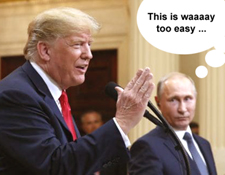 That said, the coverage of this series of incidents has been so over the top it’s almost dizzying. Mainstream center-left commentary has portrayed this performance as evidence of treason, selling out the country, proof that Donald Trump is a mere puppet of the nefarious Vladimir Putin. It’s a circumstance in which everyone from war hawks like John McCain to drone apologist John Brennan to Rachel Maddow is in full agreement: Trump should have been tougher on the Russians. He should have never held this summit. Our country was “attacked” by Russia. Their interference in our election was “an attack on American Democracy” of a magnitude similar to Pearl Harbor and 9/11. How many died in the battle of Election 2016? Ask these folks.
That said, the coverage of this series of incidents has been so over the top it’s almost dizzying. Mainstream center-left commentary has portrayed this performance as evidence of treason, selling out the country, proof that Donald Trump is a mere puppet of the nefarious Vladimir Putin. It’s a circumstance in which everyone from war hawks like John McCain to drone apologist John Brennan to Rachel Maddow is in full agreement: Trump should have been tougher on the Russians. He should have never held this summit. Our country was “attacked” by Russia. Their interference in our election was “an attack on American Democracy” of a magnitude similar to Pearl Harbor and 9/11. How many died in the battle of Election 2016? Ask these folks.
This much I know: Trump was essentially wasting our time meeting with the Russian president. No significant advance work was done, and God knows there are a lot of issues that should be discussed with Putin and his government, particularly with the latest START treaty cruising toward expiration. That isn’t treason so much as Trump being the usual incompetent boob. Now, I have no doubt that the president either has extensive financial interests in Russia in the form of loans from oligarchs and gangsters or would like to do business there in the future and, therefore, is eager to curry favor with the wealthy cabal of gangsters that own that country. I even think it’s possible that Trump’s laser-like focus on his own self-interest may have prompted him to violate the law by exchanging some pledge of Russia-friendly presidential action for help in the election. Time will tell.
But is Trump some kind of Manchurian candidate? God no. He is loyal to nothing but himself. So in a sense he’s a traitor to the country, but only in the same way that most rich people are, placing wealth above all else, forsaking all but self, to paraphrase Adam Smith. On that, he’s guilty as charged.
luv u,
jp

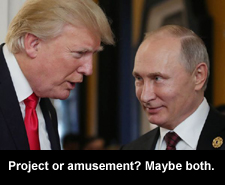 I have to think that, within the confines of their fondest fevered dreams, Putin and his allies may think the United States would be easier to deal with if our form of government was more like theirs – namely, a relatively bald-faced oligopoly. Trump brings us a hell of a lot closer to that anti-ideal than we have been in decades. He is acting in a dictatorial fashion, treating the Justice Department like it was his own personal legal team. He is denigrating the FBI in a way that would make a sixties radical (or throw-back, like me) blush. He is cutting deals with foreign governments and the centers of private wealth that give them their marching orders, all to enhance the Trump brand and fill its coffers. There’s nothing in this that Putin would find disagreeable.
I have to think that, within the confines of their fondest fevered dreams, Putin and his allies may think the United States would be easier to deal with if our form of government was more like theirs – namely, a relatively bald-faced oligopoly. Trump brings us a hell of a lot closer to that anti-ideal than we have been in decades. He is acting in a dictatorial fashion, treating the Justice Department like it was his own personal legal team. He is denigrating the FBI in a way that would make a sixties radical (or throw-back, like me) blush. He is cutting deals with foreign governments and the centers of private wealth that give them their marching orders, all to enhance the Trump brand and fill its coffers. There’s nothing in this that Putin would find disagreeable.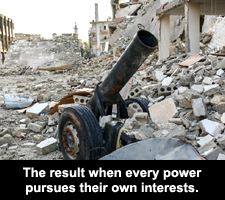 Restraining a Trump administration powered by John Bolton and Mike Pompeo is going to be difficult. It isn’t made any easier by internal divisions evident on the left. Clearly we don’t need to agree on everything to agree that American intervention in Syria is a bad idea and shouldn’t be done. There’s a natural tendency to turn conflicts of this type into a kind of zero-sum game between bad players and good players; this is not unique to the left, obviously. There are people on the left who support the rebellion in Syria and those who think it’s populated entirely by terrorists. Likewise, I’ve heard leftists essentially align themselves with the Assad regime and others call for its overthrow.
Restraining a Trump administration powered by John Bolton and Mike Pompeo is going to be difficult. It isn’t made any easier by internal divisions evident on the left. Clearly we don’t need to agree on everything to agree that American intervention in Syria is a bad idea and shouldn’t be done. There’s a natural tendency to turn conflicts of this type into a kind of zero-sum game between bad players and good players; this is not unique to the left, obviously. There are people on the left who support the rebellion in Syria and those who think it’s populated entirely by terrorists. Likewise, I’ve heard leftists essentially align themselves with the Assad regime and others call for its overthrow.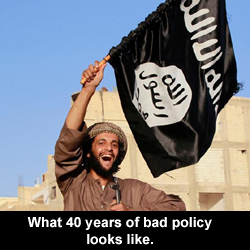 The trouble with approaching these issues with an imperial mindset is that we are blind to our own failures while expressing righteous indignation over the failings of others. Russia’s military action in Syria is a good example. They are perhaps the fifth or sixth power to drop bombs in that unfortunate country. Their strategy, while militaristic and morally bankrupt, is not difficult to understand – they view Islamic radicalism as an extreme threat, and they make the not unrealistic assumption that the fall of Syria’s government would result in a failed state something like Libya or Somalia or Iraq (all of which are beneficiaries of our aforementioned bellicosity). So, like the U.S.’s support of Saudi’s murderous campaign in Yemen, they are applying force in support of Assad’s crumbling regime.
The trouble with approaching these issues with an imperial mindset is that we are blind to our own failures while expressing righteous indignation over the failings of others. Russia’s military action in Syria is a good example. They are perhaps the fifth or sixth power to drop bombs in that unfortunate country. Their strategy, while militaristic and morally bankrupt, is not difficult to understand – they view Islamic radicalism as an extreme threat, and they make the not unrealistic assumption that the fall of Syria’s government would result in a failed state something like Libya or Somalia or Iraq (all of which are beneficiaries of our aforementioned bellicosity). So, like the U.S.’s support of Saudi’s murderous campaign in Yemen, they are applying force in support of Assad’s crumbling regime.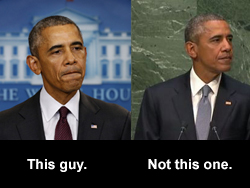 One can only guess what was running through the minds of so many members of the General Assembly when they listened to this balderdash, particularly those who have been on the receiving end of American military and economic power. Sure, it’s heavy handed and gratuitous for Russia to start bombing parts of western Syria. I imagine there are countries who have sufficient moral standing to take issue with that. The United States is not one of them. We haven’t a leg to stand on in that regard, and the fact that we complain the loudest about Russia’s action is a bit too much like the kleptomaniac yelling “Thief!”
One can only guess what was running through the minds of so many members of the General Assembly when they listened to this balderdash, particularly those who have been on the receiving end of American military and economic power. Sure, it’s heavy handed and gratuitous for Russia to start bombing parts of western Syria. I imagine there are countries who have sufficient moral standing to take issue with that. The United States is not one of them. We haven’t a leg to stand on in that regard, and the fact that we complain the loudest about Russia’s action is a bit too much like the kleptomaniac yelling “Thief!”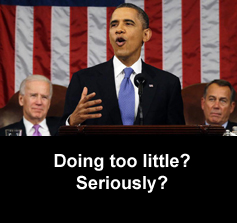 Then there’s “Morning Joe” (or “Morning Blow”) on purportedly liberal/progressive MSNBC. Their foreign policy braintrust of, well, Joe Scarborough, Richard Haas, and various senior editors from Politico have been engaging in a narrative that goes something like this, in short – “W” Bush did too much, Obama does too little, and both put us in greater danger from the scourge of jihadist terrorism, which has killed nearly one person in the United States so far this year (call it none). Setting aside the obsessive focus on this rare and sensational threat, I agree with the assertion that both presidents’ foreign policies have put us in greater danger, breeding a new generation extremists, several of whom, for instance, attacked the offices of Charlie Ebdo in Paris. But the notion that Obama does too little is ludicrous. Bush and Obama basically have the same foreign policy. Obama is following Bush’s playbook from 2006-08. And yes, it is murderous and destabilizing and designed to radicalize people.
Then there’s “Morning Joe” (or “Morning Blow”) on purportedly liberal/progressive MSNBC. Their foreign policy braintrust of, well, Joe Scarborough, Richard Haas, and various senior editors from Politico have been engaging in a narrative that goes something like this, in short – “W” Bush did too much, Obama does too little, and both put us in greater danger from the scourge of jihadist terrorism, which has killed nearly one person in the United States so far this year (call it none). Setting aside the obsessive focus on this rare and sensational threat, I agree with the assertion that both presidents’ foreign policies have put us in greater danger, breeding a new generation extremists, several of whom, for instance, attacked the offices of Charlie Ebdo in Paris. But the notion that Obama does too little is ludicrous. Bush and Obama basically have the same foreign policy. Obama is following Bush’s playbook from 2006-08. And yes, it is murderous and destabilizing and designed to radicalize people.
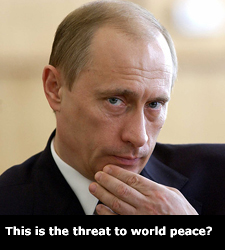 At the close of the Cold War, it was understood that expansion of NATO would be seen as provocative by Russia, but because Russia was in a weak position, their economy destroyed by massive privatization, shock therapy structural adjustment, guided by some of our Chicago-school fanatics, we felt free to ignore their concerns. That worked so long as our drunken ally Yeltsin was in command. But now that the extremely powerful Russian presidency (which we supported under Yeltsin) has been inherited by a sober ex-KGB officer, and the Russian economy has been lifted somewhat by oil revenues, they have found the confidence to voice their objections. And, of course, we’re shocked, shocked!
At the close of the Cold War, it was understood that expansion of NATO would be seen as provocative by Russia, but because Russia was in a weak position, their economy destroyed by massive privatization, shock therapy structural adjustment, guided by some of our Chicago-school fanatics, we felt free to ignore their concerns. That worked so long as our drunken ally Yeltsin was in command. But now that the extremely powerful Russian presidency (which we supported under Yeltsin) has been inherited by a sober ex-KGB officer, and the Russian economy has been lifted somewhat by oil revenues, they have found the confidence to voice their objections. And, of course, we’re shocked, shocked!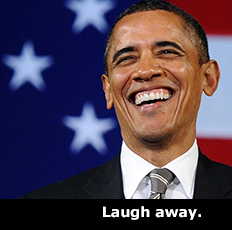
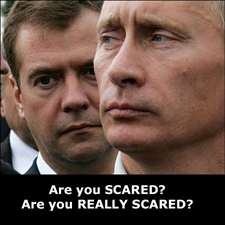 Right, well … I was never a big fan of Dave’s, but you get the idea. Part of the problem with our once-over-lightly media culture is that there is an extraordinarily rapid resort to black-and-white, wrong vs. right narratives that are easy to report, easy to digest, easy to repeat again and again. In all that, we lose the sense that it’s possible to have two assholes in a fight – adversaries who are divided by conflicting claims, not by a contrast between absolute good and absolute evil.
Right, well … I was never a big fan of Dave’s, but you get the idea. Part of the problem with our once-over-lightly media culture is that there is an extraordinarily rapid resort to black-and-white, wrong vs. right narratives that are easy to report, easy to digest, easy to repeat again and again. In all that, we lose the sense that it’s possible to have two assholes in a fight – adversaries who are divided by conflicting claims, not by a contrast between absolute good and absolute evil.